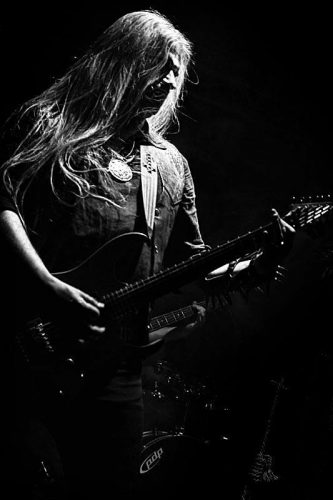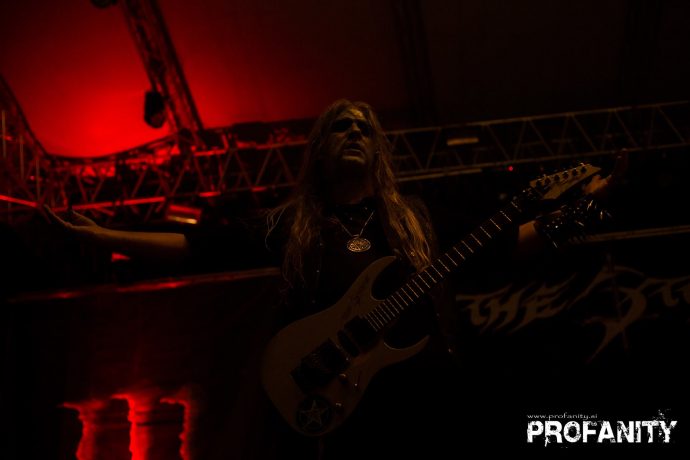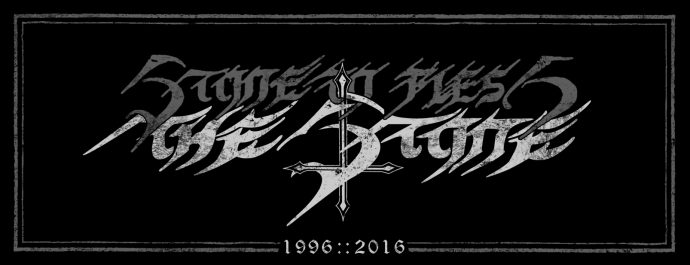(Music journalist Konstantin, who in past years has written for Serbia’s Nocturne Music Magazine, makes his first appearance at NCS with this extensive interview of Kozeljnik, founding guitarist and composer of the long-running Serbian black metal band The Stone and a participant in many other groups as well. Part 2 of this interview will follow tomorrow.)
Proudly standing in the underground waters for more than two decades, The Stone have engraved their name as one of the pivotal names in the Eastern European black metal scene of the ‘90s. From a war-torn country under embargo where buying the latest CD of your favorite band was practically impossible to touring with Revenge and Inquisition, they have cleared their path with strength and spirit.
In a detailed conversation with Kozeljnik (The Stone, Kozeljnik, May Result, Oculus, Murder, Ophidian Coil) we recall those days; and we discuss such topics as where metal has made mistakes in the last years and why that one legendary US act decided to have special gigs in the Balkan woods years ago.
******
K: I must say that in the last period we have been quiet when it comes to the interviews. We are at the point when almost everything has been already said and the amount of information is enormous. I can’t remember when was the last time that I actually sat down and read one whole interview – it’s not because I don’t want to but because there is so much information around. Nowadays people can get immediate information on the Facebook pages of the bands; being on any social media brings you huge amount of information.
Well, I guess it dominantly comes from the fact that there is no selection now. Everyone can publish anything; the “critics” are present everywhere so when we go to the net we are “splashed” by all sorts of information. I guess someone would call this article junk, as well. Then, naturally, we cannot manage to see or read everything.
Let’s get back to the beginnings and mid ‘90s in then-Yugoslavia. How you got in touch with extreme and black metal and how was it during those years to discover something completely new in a situation when even more famous stuff was not available. I guess tape-trading was one of the ways.
Well, to understand the situation in that period, we need to mention how it was before all the shit started in the Balkans — before the war.
In the end of the ‘80s Yugoslavia was quite a good place and ambience for metal. There were lots of people, there were bands, magazines, labels, tours – therefore, there was a scene — and everything ended when the war started. So, the ‘90s were practically the new beginning for everything. Slovenia was the most active part, let’s say. There was the label Nika which was the official distributor of Roadrunner releases, and the majority of the tours were passing there. In general, ex-Yugoslavia was a really active environment if we speak about rock music.
I belong to a generation which started to listen to heavy metal in the late ‘80s, when only vinyl and tapes were present and CDs were still unavailable. There were music “marketplaces” where we were able to discover things from the west and buy new releases. We were following the scene through that. However, when war started, although it was not on the territory of Serbia, the whole country suffered and tape-trading was left as the only possibility to get your hands on either music or zines. In the first place there were some Polish bootleg albums which were coming by different ways into the country. It was difficult for any sound, so death and black metal were in an even worse position.
Finally, somewhere around ’94 I started to make mail orders in a really old school way – I used to hide money inside an envelope, send it to the label, and hope that it would arrive. Usually packages were coming after four weeks and, luckily for us, customs were liberal those days so they were not putting almost any taxes on the packages.
In ’95 the first ex-Yugoslav black metal band appears — Introitus. What were the reactions then and how did it affect you? How was the scene developing in those years?
To be honest, I found out about them at the end of ’96 and until then I was not familiar with any other band playing black metal besides us (May Result was formed in the mid-’95). Although there were bands in other countries which were born after the war, we all continued to live without following too much of what was happening in other ex-Yu states.
On Serbian soil in the mid ‘90s there were bands with other sounds present – Psychoparadox, Ritual, Eclipse, Acroholia, Heretical Guilt, Scaffold — but unfortunately all of them either issued a very small number of releases or lasted only for a short time. It was either due to the overall situation in the country during those years, lack of enthusiasm, problems, I don’t know, but there weren’t many bands active. In the end, The Stone (known as Stone to Flesh from 1996 to 2001) remained as the only band continuously active with no single break for two decades, both live and in studio.
It is sad that there were some really good acts before that but none of them managed to last longer or to be more active in the studio. Heller and Bloodbath were really influential, but both of them remained with one or two albums issued, so with a sort of cult status only among us in the country. Many bands have appeared but they were always active only for several years, without making any important impact or influence.
So, it was quite hard to remain active in those conditions, to have continuity in your work and therefore, we can’t say many positive things about the scene in the country during those years. Nowadays, there are bands which have already been active for more than 10 years, Infest or Space Eater for example, and I really hope that they will manage to survive and leave a more important impact internationally.
What is is that Serbian or ex-Yu bands lack to be more present internationally? Is is dedication, persistence, or is it only the technical quality which is missing? I would say that in the last years we have advanced a lot. The first album of Terrorhammer has received great feedback from many countries, and Nadimac have played as a support to the legendary Sodom.
The bands you mentioned don’t have much in common with us, I mean they don’t play black metal, but you are right and behind their success are years of hard work.
I don’t know if I can tell exactly what the reason is for this lack of presence of the black metal bands from the Balkans on an international level. Maybe something of the aforementioned reasons, who knows? We can’t say that we have some special black metal scene, and I don’t mean here in Serbia only but in other countries as well — you cannot name more than five bands from the region which have had continuous studio careers with decent quality through all their albums and who are still working and progressing. Maybe someone would say differently, but that is how I see it.
I would say that it is connected a lot with the fact that any kind of non-commercial music in the region does not provide any financial satisfaction, so people need first to think about existential things and then about their music activities. Being underground is a lot more different in Serbia than in, for example, Germany, Sweden, USA…
Of course, here, any kind of non-mainstream art comes from the pure enthusiasm and passion for that, particularly in this field. Simply, people cannot invest in their music. If we take for an example Scandinavian bands, we can see that their success didn’t come only from their capability to make music on a high level, as they did, but as well because they were able to put money into it. Watain didn’t achieve this status just like that; they were capable of seriously investing over the years. Behemoth as well, they have been investing for almost two decades in order to be where they are now. It would be interesting to know how much money all of them have put in so far.
No band from this region is capable of doing that, and at some point money makes a difference, whether we accept it or not. We can speak about “what if” scenarios and what could have happened if there had been no war and there had been a continuance of the scene from the ‘80s when even the country was functioning well. Unfortunately, it still remains mainly the product of someone’s passion, dedication, and willingness to create music for the sake of love for it.
Who knows, with constant development and progress it could become something like scenes in the Czech Republic or Poland today, which are both good examples. Not only for black metal, but in general, thrash, heavy, or death. Both of these countries have passed a transition from communism to democratic society, but they were not interrupted by war, and that is what made us start practically from zero. “Making” a scene was not even an idea, but just to play black metal and do it good.
What were the reactions to your first recordings and how did people accept a black metal band from Serbia (Yugoslavia in that period)?
When our first demo was published (“Serbian Woods” in 1995) we got in contact with Alex from Daimonion Productions from Greece who decided to issue this material. He became known later for the work with bands The One, Macabre Omen, Razor of Occam, Lvcifyre. The reactions were really good, as he printed the demo twice and managed to sell or trade all copies he made. In those years many (at that moment) unknown bands issued material through Daimonion, among others Keep of Kalessin, Varathron, Macabre Omen, so we were satisfied to be part of that. Back then the internet was still almost unavailable, so we mostly received feedback from people from Serbia and by letters which were sent to us.
Your lyrics have never been connected directly to Satanism or Luciferianism but mostly were inspired by Slavic paganism and later on by misanthropy, nihilism, death. Could we say that it is maybe even easier to sing about those things, being surrounded by never-ending problems in Serbia?
We have never followed a default expression in black metal although we, as well, don’t want to escape the initial idea and attitude behind it. Slavic paganism, indeed, was the major inspiration on our first demo and our second album “Slovenska krv” (Slavic blood; the second overall album having issued with the band’s first name Stone to Flesh). However, we used it only as an inspiration, an idea, to point out and focus on individualism. We didn’t try to implement a “by the book” approach to paganism themes but to channel it and express individual perceptions of pagan belief.
Later on we moved our focus to the subjects you mentioned in the question, but still, with a strong presence of the individual expression in it. Nefas (vocalist) is the author of all lyrics and his style is quite specific – sometimes very direct and simple, yet archaic, dealing with known feelings and situations. One could say that his style is banal, however it seems so only at first sight, and I consider him for a real poet. He proved that through all seven albums and several EP recordings, and I really feel sorry that it cannot be fully translated into other languages and explained exactly as it is in our mother tongue.
That being said, I sometimes think how people who listen to us and don’t understand Serbian will always miss one part of our music due to the fact that they cannot understand his lyrics.
(Part Two of this interview will continue at NCS tomorrow.)
Photo credits here and in Part Two: Profanity; Zoran Stanic



